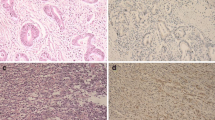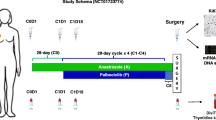Abstract
Purpose
The primary purpose of this study was to evaluate the role of thymidylate synthase (TS) and thymidine phosphorylase (TP) as biomarkers to predict clinical outcomes of capecitabine monotherapy in patients with anthracycline- and taxane-pretreated metastatic breast cancer (MBC).
Methods
Of the patients who were previously treated with anthracycline and taxane regimens, 90 patients who had available tissue block for immunohistochemistry with measurable lesions were included. All patients received capecitabine (2,500 mg/m2/day) for 14 days every 3 weeks.
Results
High TS expression was more common among patients with triple-negative (TN) subtype than among patients with other subtypes (33% for hormone receptor+, 8% for HER2+, and 58% for TN, P = 0.023). The median PFS was significantly lower in patients with high TS (6.6 vs. 3.0 months; P = 0.017) and low TP expressions (6.0 vs. 3.3 months; P = 0.013). A high TS and a low TP expressions were identified as unfavorable independent risk factors for PFS to capecitabine monotherapy in multivariate analysis (hazard ratio [HR], 1.7, P = 0.037 for high TS score; HR, 1.8, P = 0.014 for low TP score).
Conclusions
Our data suggest that high TS and low TP scores correlate with a shorter PFS for capecitabine monotherapy in patients with anthracycline- and taxane-pretreated MBC.




Similar content being viewed by others
References
Blum JL (1999) Xeloda in the treatment of metastatic breast cancer. Oncology 57(Suppl 1):16–20
Blum JL, Dieras V, Lo Russo PM, Horton J, Rutman O, Buzdar A, Osterwalder B (2001) Multicenter, phase II study of capecitabine in taxane-pretreated metastatic breast carcinoma patients. Cancer 92:1759–1768
Blum JL, Jones SE, Buzdar AU, LoRusso PM, Kuter I, Vogel C, Osterwalder B, Burger HU, Brown CS, Griffin T (1999) Multicenter phase II study of capecitabine in paclitaxel-refractory metastatic breast cancer. J Clin Oncol 17:485–493
Fumoleau P, Largillier R, Clippe C, Dieras V, Orfeuvre H, Lesimple T, Culine S, Audhuy B, Serin D, Cure H, Vuillemin E, Morere JF, Montestruc F, Mouri Z, Namer M (2004) Multicentre, phase II study evaluating capecitabine monotherapy in patients with anthracycline- and taxane-pretreated metastatic breast cancer. Eur J Cancer 40:536–542
Wagstaff AJ, Ibbotson T, Goa KL (2003) Capecitabine: a review of its pharmacology and therapeutic efficacy in the management of advanced breast cancer. Drugs 63:217–236
Fox SB, Moghaddam A, Westwood M, Turley H, Bicknell R, Gatter KC, Harris AL (1995) Platelet-derived endothelial cell growth factor/thymidine phosphorylase expression in normal tissues: an immunohistochemical study. J Pathol 176:183–190
Budman DR, Meropol NJ, Reigner B, Creaven PJ, Lichtman SM, Berghorn E, Behr J, Gordon RJ, Osterwalder B, Griffin T (1998) Preliminary studies of a novel oral fluoropyrimidine carbamate: capecitabine. J Clin Oncol 16:1795–1802
Ishikawa T, Sekiguchi F, Fukase Y, Sawada N, Ishitsuka H (1998) Positive correlation between the efficacy of capecitabine and doxifluridine and the ratio of thymidine phosphorylase to dihydropyrimidine dehydrogenase activities in tumors in human cancer xenografts. Cancer Res 58:685–690
Ishikawa T, Utoh M, Sawada N, Nishida M, Fukase Y, Sekiguchi F, Ishitsuka H (1998) Tumor selective delivery of 5-fluorouracil by capecitabine, a new oral fluoropyrimidine carbamate, in human cancer xenografts. Biochem Pharmacol 55:1091–1097
Popat S, Matakidou A, Houlston RS (2004) Thymidylate synthase expression and prognosis in colorectal cancer: a systematic review and meta-analysis. J Clin Oncol 22:529–536
Liekens S, Bronckaers A, Perez-Perez MJ, Balzarini J (2007) Targeting platelet-derived endothelial cell growth factor/thymidine phosphorylase for cancer therapy. Biochem Pharmacol 74:1555–1567
Puglisi F, Cardellino GG, Crivellari D, Di Loreto C, Magri MD, Minisini AM, Mansutti M, Andreetta C, Russo S, Lombardi D, Perin T, Damante G, Veronesi A. (2008) Thymidine phosphorylase expression is associated with time to progression in patients receiving low-dose, docetaxel-modulated capecitabine for metastatic breast cancer. Ann Oncol 19:1541–1556 (Epub 2008 Apr 25)
Aschele C, Debernardis D, Bandelloni R, Cascinu S, Catalano V, Giordani P, Barni S, Turci D, Drudi G, Lonardi S, Gallo L, Maley F, Monfardini S (2002) Thymidylate synthase protein expression in colorectal cancer metastases predicts for clinical outcome to leucovorin-modulated bolus or infusional 5-fluorouracil but not methotrexate-modulated bolus 5-fluorouracil. Ann Oncol 13:1882–1892
Aschele C, Debernardis D, Casazza S, Antonelli G, Tunesi G, Baldo C, Lionetto R, Maley F, Sobrero A (1999) Immunohistochemical quantitation of thymidylate synthase expression in colorectal cancer metastases predicts for clinical outcome to fluorouracil-based chemotherapy. J Clin Oncol 17:1760–1770
Cascinu S, Aschele C, Barni S, Debernardis D, Baldo C, Tunesi G, Catalano V, Staccioli MP, Brenna A, Muretto P, Catalano G (1999) Thymidylate synthase protein expression in advanced colon cancer: correlation with the site of metastasis and the clinical response to leucovorin-modulated bolus 5-fluorouracil. Clin Cancer Res 5:1996–1999
Corsi DC, Ciaparrone M, Zannoni G, Mancini M, Cassano A, Specchia M, Pozzo C, Martini M, Barone C (2002) Predictive value of thymidylate synthase expression in resected metastases of colorectal cancer. Eur J Cancer 38:527–534
Johnston PG, Mick R, Recant W, Behan KA, Dolan ME, Ratain MJ, Beckmann E, Weichselbaum RR, Allegra CJ, Vokes EE (1997) Thymidylate synthase expression and response to neoadjuvant chemotherapy in patients with advanced head and neck cancer. J Natl Cancer Inst 89:308–313
Tominaga T, Toi M, Ohashi Y, Abe O (2002) Prognostic and predictive value of thymidine phosphorylase activity in early-stage breast cancer patients. Clin Breast Cancer 3:55–64
Toi M, Atiqur Rahman M, Bando H, Chow LW (2005) Thymidine phosphorylase (platelet-derived endothelial-cell growth factor) in cancer biology and treatment. Lancet Oncol 6:158–166
Hu YC, Komorowski RA, Graewin S, Hostetter G, Kallioniemi OP, Pitt HA, Ahrendt SA (2003) Thymidylate synthase expression predicts the response to 5-fluorouracil-based adjuvant therapy in pancreatic cancer. Clin Cancer Res 9:4165–4171
Siva M, Correa P, Skaria S, Canney P (2008) Capecitabine in advanced breast cancer: predictive factors for response. J Clin Oncol 26:72S (Abstr 1126)
Muss HB, Berry DL, Cirrincione C, Theodoulou M, Mauer A, Cohen H, Partridge AH, Norton L, Hudis CA, Winer EP, North American Breast Cancer InIntergroup (2008) Standard chemotherapy (CMF or AC) versus capecitabine in early-stage breast cancer (BC) patients aged 65 and older: results of CALGB/CTSU 49907. J Clin Oncol 26:8S (Abstr 507)
Ciaparrone M, Quirino M, Schinzari G, Zannoni G, Corsi DC, Vecchio FM, Cassano A, La Torre G, Barone C (2006) Predictive role of thymidylate synthase, dihydropyrimidine dehydrogenase and thymidine phosphorylase expression in colorectal cancer patients receiving adjuvant 5-fluorouracil. Oncology 70:366–377
Li H, Suo Z, Zhang Y, Risberg B, Karlsson MG, Villman K, Nesland JM (2004) The prognostic significance of thymidine phosphorylase, thymidylate synthase and dihydropyrimidine dehydrogenase mRNA expressions in breast carcinomas. Histol Histopathol 19:129–136
Meropol NJ, Gold PJ, Diasio RB, Andria M, Dhami M, Godfrey T, Kovatich AJ, Lund KA, Mitchell E, Schwarting R (2006) Thymidine phosphorylase expression is associated with response to capecitabine plus irinotecan in patients with metastatic colorectal cancer. J Clin Oncol 24:4069–4077
Van Cutsem E, Cunningham D, Hoff PM, Maroun J (2001) Thymidine phosphorylase (TP) activation: convenience through innovation. Oncologist 6 (suppl 4):1–2
Yang Q, Barbareschi M, Mori I, Mauri F, Muscara M, Nakamura M, Nakamura Y, Yoshimura G, Sakurai T, Caffo O, Galligioni E, Dalla Palma P, Kakudo K (2002) Prognostic value of thymidine phosphorylase expression in breast carcinoma. Int J Cancer 97:512–517
Puglisi F, Andreetta C, Valent F, Minisini AM, Rijavec E, Russo S, Mansutti M, Cardellino G, Pizzolitto S, Di Loreto C (2007) Anthracyclines and taxanes induce the upregulation of thymidine phosphorylase in breast cancer cells. Anticancer Drugs 18:883–888
Toi M, Bando H, Horiguchi S, Takada M, Kataoka A, Ueno T, Saji S, Muta M, Funata N, Ohno S (2004) Modulation of thymidine phosphorylase by neoadjuvant chemotherapy in primary breast cancer. Br J Cancer 90:2338–2343
Andreetta C, Puppin C, Minisini A, Valent F, Pegolo E, Damate G, Di Loreto C, Pizzolitto S, Pandolfi M, Fasola G, Piga A, Puglish F (2009) Thymidine phosphorylase expression and benefit from capecitabine in patients with advanced breast cancer. Ann Oncol 20:265–271 (Epub 2008 Sep 2)
McDermott U, Settleman J (2009) Personalized cancer therapy with selective kinase inhibitors: an emerging paradigm in medical oncology. J Clin Oncol 27:5650–5659
Author information
Authors and Affiliations
Corresponding author
Additional information
Su Jin Lee and Yoon La Choi are equally contributed to this work.
Rights and permissions
About this article
Cite this article
Lee, S.J., Choi, Y.L., Park, Y.H. et al. Thymidylate synthase and thymidine phosphorylase as predictive markers of capecitabine monotherapy in patients with anthracycline- and taxane-pretreated metastatic breast cancer. Cancer Chemother Pharmacol 68, 743–751 (2011). https://doi.org/10.1007/s00280-010-1545-0
Received:
Accepted:
Published:
Issue Date:
DOI: https://doi.org/10.1007/s00280-010-1545-0




